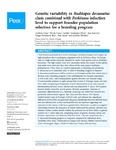Mostrar o rexistro simple do ítem
Genetic Variability in Ruditapes Decussatus Clam Combined With Perkinsus Infection Level to Support Founder Population Selection for a Breeding Program
| dc.contributor.author | Cruz, Andreia | |
| dc.contributor.author | Costa, Fiz da | |
| dc.contributor.author | Fernández-Pérez, Jenyfer | |
| dc.contributor.author | Nantón, Ana | |
| dc.contributor.author | Fernández Boo, Sergio | |
| dc.contributor.author | Insua, Ana | |
| dc.contributor.author | Méndez, Josefina | |
| dc.date.accessioned | 2020-11-27T16:24:04Z | |
| dc.date.available | 2020-11-27T16:24:04Z | |
| dc.date.issued | 2020-10-28 | |
| dc.identifier.citation | Cruz A, da Costa F, Fernández-Pérez J, Nantón A, Fernández-Boo S, Insua A, Méndez J. 2020. Genetic variability in "Ruditapes decussatus" clam combined with Perkinsus infection level to support founder population selection for a breeding program. PeerJ 8:e9728 https://doi.org/10.7717/peerj.9728 | es_ES |
| dc.identifier.issn | 2167-8359 | |
| dc.identifier.uri | http://hdl.handle.net/2183/26825 | |
| dc.description.abstract | [Abstract] Clam farmers worldwide face several challenges, including irregular seed supply and high mortalities due to pathogenic organisms such as "Perkinsus olseni". In Europe, there is a high unmet consumer demand for native clam species such as "Ruditapes decussatus". The high market value of "R. decussatus" makes the culture of this species potentially more attractive than that culture of the alien species "Ruditapes philippinarum". Thus, there is a market opportunity in breeding and producing "R. decussatus" at an industrial scale. A selective breeding program to improve "R. decussatus" performance will be carried out in Portugal; and the first critical step to develop such a breeding program is the establishment of a founder population. In this study, intra- and interpopulation genetic diversity was assessed using 13 microsatellite markers in eight natural beds located in Portugal, Spain and Italy. Also, allele and genotypic frequencies of each microsatellite locus were assessed discriminating between clams infected and non-infected by "P. olseni". All locations showed similar values for several genetic diversity parameters. Analyses of population differentiation (FST, Bayesian clustering and AMOVAs) revealed five genetically differentiated regions: Rías Altas and Rías Baixas (NW Spain), North/Central Coast of Portugal, Gulf of Cadiz and Adriatic Sea. Significant differences in the allelic and genotypic frequency distribution between infected clams and non-infected ones at four microsatellite loci are reported suggesting that resistance to the disease could have a genetic basis. Moreover, a positive or negative relationship between the frequency of certain alleles and the parasite infection was inferred. Further studies should confirm the potential use of those alleles as genetic markers for "P. olseni" infection. Integrating results of genetic diversity within and between populations and Perkinsus infection levels, a founder population for a "R. decussatu" breeding program is proposed, composed by individuals from Barallobre (Rías Altas), Pontevedra or Cangas (Rías Baixas), Óbidos (North/Central Coast of Portugal), Algarve (Gulf of Cadiz) and Venice (Adriatic Sea). | es_ES |
| dc.description.sponsorship | Governo da República Portuguesa; 22390 (16/SI/2016) (CENTRO-01-0247-FEDER-022390) | es_ES |
| dc.description.sponsorship | Ministério do Mar (Portugal); FA_01_2017_007 | es_ES |
| dc.language.iso | eng | es_ES |
| dc.publisher | PeerJ | es_ES |
| dc.relation | info:eu-repo/grantAgreement/EC/H2020/739773 | es_ES |
| dc.relation.uri | https://doi.org/10.7717/peerj.9728 | es_ES |
| dc.rights | Atribución 4.0 España | es_ES |
| dc.rights.uri | http://creativecommons.org/licenses/by/4.0/es/ | * |
| dc.subject | Ruditapes decussatus | es_ES |
| dc.subject | Selective breeding | es_ES |
| dc.subject | Perkinsus infection | es_ES |
| dc.subject | Genetic diversity | es_ES |
| dc.subject | Microsatellites | es_ES |
| dc.title | Genetic Variability in Ruditapes Decussatus Clam Combined With Perkinsus Infection Level to Support Founder Population Selection for a Breeding Program | es_ES |
| dc.type | info:eu-repo/semantics/article | es_ES |
| dc.rights.access | info:eu-repo/semantics/openAccess | es_ES |
| UDC.journalTitle | PeerJ | es_ES |
| UDC.volume | 8 | es_ES |
| UDC.startPage | e9728 | es_ES |
Ficheiros no ítem
Este ítem aparece na(s) seguinte(s) colección(s)
-
GI-XENOMAR - Artigos [8]
-
OpenAIRE [368]






